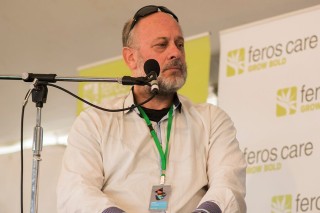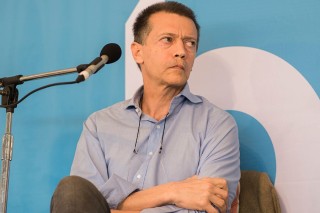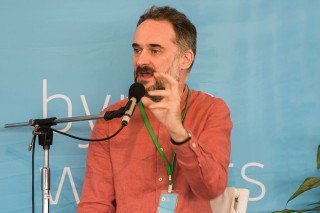Philosophies for a better future
What are we, how do we relate to the planet, and how does our language shape connections with the land?
These intriguing topics helped to make up a philosophical discussion, which delved into the very meaning of being, and how we might realise our future as humans.

Award-winning author Steven Lang chaired this conversation which first touched on fundamental environmental issues before taking a left turn to consider how humans relate (or not) with other species. The dialogue then examined the effect of language on our relationship with nature.
Well-known author and environmentalist Tim Flannery initially brought up familiar themes of exponential population growth and the related topic of global warming.
Yet Flannery located a moral factor amongst these issues, saying that we need to ‘search for levers which will allow us to deal with these legacy issues’.
He added that although technology holds huge promise for addressing environmental issues, it is ‘just one tool – we must have the right moral compass’.
Pulitzer Prize finalist David Haskell gave a practical example of this required change of ethics, citing the country of Ecuador which has written forest conservation and the concept of interconnectivity between humans and nature into the Ecuadorian constitution.
As was to be expected in a session titled Stories from Nature’s Great Connectors, the concept of interconnectivity wove a central thread through the discussion.

Author and journalist Nicolas Rothwell said that ‘it is from nature that everything comes…this is all very plain.’
Haskell pointed out that whether on a social, ecological or chemical level, humans are ‘deeply interconnected’ with the environment around them.
‘We are made from relationships,’ he said. ‘Without these connections we wither and die.’
However, Rothwell put forward the absorbing idea that perhaps language, and specifically the English language in Australia, is actually stifling connections with the land.
He theorised that when Australia was colonised, the English brought their language to a land where water is more scarce and fire is ‘not a threat but a germinating force’.
He said that whereas Indigenous language has evolved with the landscape, the English language in Australia does not necessarily reflect where it is physically situated.

Haskell contributed to this captivating thread by demonstrating that whereas other languages tend to be ‘verb-rich’, English tends to be ‘noun-heavy’.
He pointed out that where in English the word ‘river’ is a noun, in other languages ‘river’ is a verb, leading to the idea that relationships with nature could be greatly enhanced by using language in a way which describes processes instead of merely categorizing.
What is the function of a name? Imagine our different conception of the world if our language described what it means ‘to tree’…
‘Our language puts out an illusion of separation, of ticking boxes,’ said Haskell.
‘Any set of words fails to capture the complexity of life.’
Many of us seek to communicate honesty using language but Rothwell’s statement that ‘in the beauty of nature we can locate some kind of truth’ speaks volumes.
Chris Speed is a Southern Cross University Bachelor of Digital Media and Communications student.
